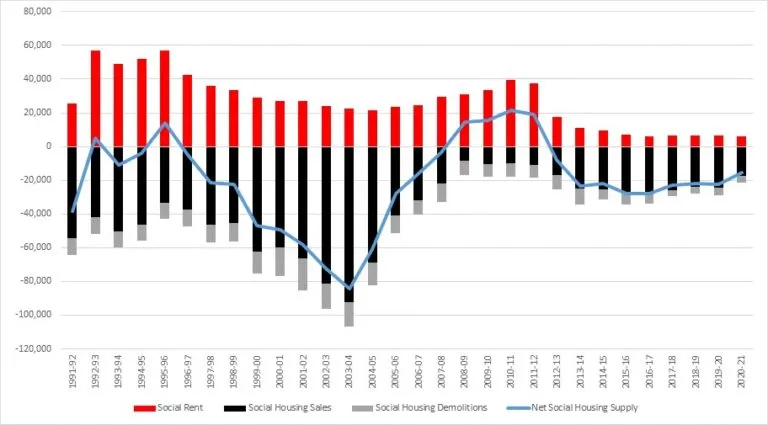The cause of the housing emergency is government inaction. So why place the blame anywhere else?
Published: by Reshima Sharma

People have a right to be angry about the state of housing in this country. There is a lot to be angry about: 59,000 families are living in temporary accommodation and 120,000 children will go to sleep homeless tonight.
But in recent weeks, we’ve seen an uptick in inaccurate and disturbing remarks about the cause of our country’s spiralling housing emergency.
The failure of government to build enough social housing and reform our broken private rented sector is at the heart of the housing emergency. But too often rising housing costs and a lack of adequate housing is blamed on migrants and people seeking refuge and asylum in the UK.
Not only is this narrative racist and deeply pernicious, it is also wildly inaccurate. And sadly, it gets repeated far too often. At Shelter, we know the real causes of the housing emergency and it is important to set the record straight.
Social housing is in decline
For decades, social housing has been in decline and social homes are disappearing at an alarming rate across the country. In the last decade, we’ve lost more than 282,000 social homes to sales through Right to Buy, conversions to other tenures, or to demolitions.
But we’ve not been building enough to make up for this overwhelming loss. Last year, just over 6,000 social homes were built across England. That’s nowhere near enough to meet the need of the million households on social housing waiting lists across the country.

Graph source: Ministry of Housing, Communities & Local Government (MHCLG), Live tables on social housing sales, Table 678 and Table 684. MHCLG, Live tables on affordable housing supply, Table 1000C.
The reason we build such a pitifully low number of social homes is because the whole system is rigged against building social housing. Private developers can wriggle out of obligations to build social homes, government funding favours less affordable types of homes, and the broken land market makes it nearly impossible for councils to purchase land at a fair price and actually build social homes. These are systemic, structural problems that only dedicated action from the government can fix.
The chronic lack of social housing is having a devastating impact across the housing market in every corner of England from coastal towns to inner cities. Young people are being priced out of their neighbourhoods. Families are being forced to live in overcrowded homes just to keep a roof over their heads. And more and more people are trapped in the expensive, insecure private rented sector.
The private rented sector is in desperate need of reform
As social housing has declined, the numbers living in the private rented sector has ballooned. There are 1.4 million fewer households living in social housing than there were in 1980. In the same period, the private rented sector has more than doubled.
This exponential market growth, made possible by financial incentives for landlords and a lack of regulation, has resulted in 11 million people now living in a private rented sector characterised by insecurity, poor conditions and high prices. The private rented sector is not fit for purpose and is in dire need of reform to make it more secure, more accountable and safer for the millions that rely on it for their home.
The government has been promising for years to reform the private rented sector by scrapping unfair “no fault” evictions and driving up standards. But despite promises to bring forward a comprehensive Renters’ Reform Bill, renters are still waiting for change.
We need social housing – not scapegoating
If a private renter is evicted from their home so that their landlord can put up the rent, it would not be the fault of the new tenants paying the increased rent. The fault lies with a broken private rented sector which has insecurity baked into the system, and a lack of truly affordable housing driving up the cost of rent.
If a family living in an overcrowded, unsuitable home is unsuccessful on their latest bid for a social home, it is not the fault of another family that is successfully housed. The fault lies with a dire lack of social housing that means millions of households wait years on social housing waiting lists.
It is wrong and unjustifiable to place the blame for our country’s housing emergency on anything but inaction and failure from Government.
We have seen horrifying reports in recent weeks of the treatment of thousands of asylum seekers in Manston immigration centre, who have been forced to live in overcrowded, dangerous conditions for unlawfully long periods of time. Families and individuals who are fleeing war and persecution are some of our society’s most vulnerable people – and are not to blame for the structural problems at the heart of our broken housing system.
In fact, asylum seekers will not be eligible at all for social housing or housing benefit, nor do they have the right to rent in the private rented sector.This means many former asylum seekers are left homeless and in destitution.
Instead of sowing division between groups at the sharp end of the housing emergency, it’s time we put responsibility back where it belongs. The government need to fix our broken housing system by building a new generation of social homes and reforming private renting.
Join us in our fight to defend everyone’s right to a safe, decent home and become part of Shelter’s campaign today.